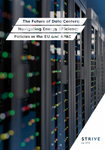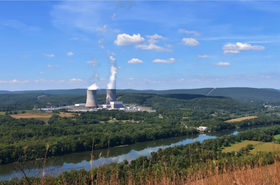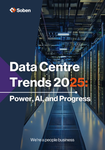Imagine a data center that has no negative impact on the existing power grid. How is this possible? Through strategic data center placement near renewable power sources to offset carbon emissions.
This may sound too good to be true, but it is in fact the new reality for data center developers as they look to align data center expansion with sustainability initiatives. However, this can only be achieved through ensuring that the land is sourced and secured responsibly.
Forecasts from Clean Grid Initiative estimate that more than 90GW of data center demand could be added to the grid nationally by the end of the decade; the equivalent of about nine New York City-size blocks. This rapid growth has significant environmental implications, from increased energy use to greater carbon emissions, which is why major energy companies are already preparing.
To meet sustainability goals while supporting this expansion, companies such as Exxon Mobil and Chevron are investing in carbon capture and natural gas infrastructure to meet sustainability goals. Exxon Mobil has even estimated that data centers will account for 20 percent of the carbon-capture and storage market by 2050.
This trend also raises a crucial question around land use: how are data centers themselves securing the necessary assets to offset their energy usage? The answer lies in developing data centers in tandem with solar fields, wind farms, and hydro plants – and in some cases, development of a renewable energy source in parallel with building the data center itself.
However, these massive projects require thorough research and land-use planning to align with zoning restrictions and local regulations. That’s where the title insurance enters the conversation, ensuring the infrastructure behind these data centers and related energy sources is as secure as possible for generations to come.
Developing data center projects to take advantage of renewable energy resources comes with a litany of hurdles from private owners, utility companies, and even local governments. In any instance, building on land with unclear or disputed ownership can cause legal challenges and project halts down the road, making proper title insurance critical to successful data center development.
Insurance and ownership to address zoning risks
At its core, title insurance serves as a safeguard for property owners and land developers. It protects property buyers from legal claims and disputes around the ownership of a specific piece of land. For data centers specifically, the immense cost and size of these facilities require a level of absolute certainty in land ownership. Any unresolved issue related to a land’s title, such as outdated easements or boundary disputes, can significantly, or entirely, delay these projects.
Clear title ownership is more than simply a formality; it’s a necessity for developers to consider when overseeing these large types of infrastructure projects. For data center infrastructure specifically, where construction timelines are often condensed and require millions in funding, any disruption caused by an outdated title can significantly hinder the project’s development.
While proper protection through title insurance allows data center developers to catch potential disputes around land ownership, it also plays a crucial role in surfacing zoning inconsistencies that can delay infrastructure development.
Zoning conflicts, in particular, can be one of the most common challenges, given the scarce amount of land that allows for renewable data centers to be built. As the geographical locations for these projects often require open, rural land that are nearby renewable energy sources, it is paramount that developers protect their projects through proper title in case zoning issues arise. There are only so many suitable locations for renewable data center infrastructures, meaning if an ongoing renewable data center project is faced with zoning issues regarding land ownership, it can quite possibly derail the project in its entirety.
By having adequate protection under title insurance, developers ensure they are safeguarded from potential issues concerning questions around the legitimacy of land ownership and zoning laws.
Title insurance as a risk management tool
While it serves as a legal requirement, title insurance can also be seen as a proactive risk management tool for data center developers. Providing undeniable proof of land ownership by having proper title allows developers to focus on innovation and operational efficiency in sustainable data center infrastructure, rather than worry about the legal challenges and pitfalls that often accompany these projects.
How developers can prepare for the future of data centers
Data center infrastructure is only going to grow in scale, scope, and size. As more data center infrastructures compete for finite land, especially land near renewable energy sources, risks around property rights, ownership claims, and infrastructure access will only increase. Developers can’t afford to be reactive; they need to anticipate and mitigate these risks from the beginning.
With sustainability serving as a core pillar for many forward-thinking organizations, data center developers must ensure that future eco-focused data center infrastructure is not just efficient but also legally protected through proper title insurance. By equipping these climate-conscious projects with the legal protection title insurance provides, developers can propel data centers into the modern, sustainably driven era of the future.
More in Construction & Site Selection
Read the orginal article: https://www.datacenterdynamics.com/en/opinions/navigating-the-land-rush-ensuring-clear-title-ownership-in-data-center-expansion/









